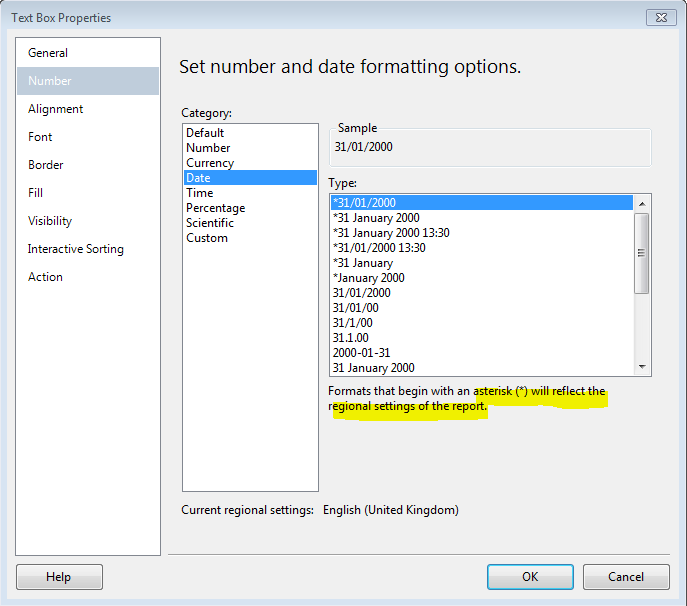I'm trying to populate an expression (default value of a parameter) with an explicit time. How do I remove the time from the the "now" function?
Found the solution from here
This gets the last second of the previous day:
DateAdd("s",-1,DateAdd("d",1,Today())
This returns the last second of the previous week:
=dateadd("d", -Weekday(Now), (DateAdd("s",-1,DateAdd("d",1,Today()))))
Something like this:
=FormatDateTime(Now, DateFormat.ShortDate)
Where "Now" can be replaced by the name of the date/time field that you're trying to convert.)
For instance,
=FormatDateTime(Fields!StartDate.Value, DateFormat.ShortDate)
Since SSRS utilizes VB, you can do the following:
=Today() 'returns date only
If you were to use:
=Now() 'returns date and current timestamp
Today() returns the date only in terms of value, but the datatype returned is DateTime. –
Bilbao =CDate(Now).ToString("dd/MM/yyyy")
Although you are hardcoding the date formart to a locale.
If you have to display the field on report header then try this... RightClick on Textbox > Properties > Category > date > select *Format (Note this will maintain the regional settings).
Since this question has been viewed many times, I'm posting it... Hope it helps.
If expected data format is MM-dd-yyyy then try below,
=CDate(Now).ToString("MM-dd-yyyy")
Similarly you can try this one,
=Format(Today(),"MM-dd-yyyy")
Output: 02-04-2016
Note:
Now() will show you current date and time stamp
Today() will show you Date only not time part.
Also you can set any date format instead of MM-dd-yyyy in my example.
Just use DateValue(Now) if you want the result to be of DateTime data type.
In the format property of any textbox field you can use format strings:
e.g. D/M/Y, D, etc.
One thing that might help others is that you can place: =CDate(Now).ToString("dd/MM/yyyy") in the Format String Property of SSRS which can be obtained by right clicking the column. That is the cleanest way to do it. Then your expression won't be too large and difficult to visually "parse" :)
FormatDateTime(Parameter.StartDate.Value)
Found the solution from here
This gets the last second of the previous day:
DateAdd("s",-1,DateAdd("d",1,Today())
This returns the last second of the previous week:
=dateadd("d", -Weekday(Now), (DateAdd("s",-1,DateAdd("d",1,Today()))))
I'm coming late in the game but I tried all of the solutions above! couldn't get it to drop the zero's in the parameter and give me a default (it ignored the formatting or appeared blank). I was using SSRS 2005 so was struggling with its clunky / buggy issues.
My workaround was to add a column to the custom [DimDate] table in my database that I was pulling dates from. I added a column that was a string representation in the desired format of the [date] column. I then created 2 new Datasets in SSRS that pulled in the following queries for 2 defaults for my 'To' & 'From' date defaults -
'from'
SELECT Datestring
FROM dbo.dimDate
WHERE [date] = ( SELECT MAX(date)
FROM dbo.dimdate
WHERE date < DATEADD(month, -3, GETDATE()
)
'to'
SELECT Datestring
FROM dbo.dimDate
WHERE [date] = ( SELECT MAX(date)
FROM dbo.dimdate
WHERE date <= GETDATE()
)
This should be done in the dataset. You could do this
Select CAST(CAST(YourDateTime as date) AS Varchar(11)) as DateColumnName
In SSRS Layout, just do this =Fields!DateColumnName.Value
My solution for a Date/Time parameter:
=CDate(Today())
The trick is to convert back to a DateTime as recommend Perhentian.
Just concatenate a string to the end of the value:
Fields!<your field>.Value & " " 'test'
and this should work!
© 2022 - 2024 — McMap. All rights reserved.

